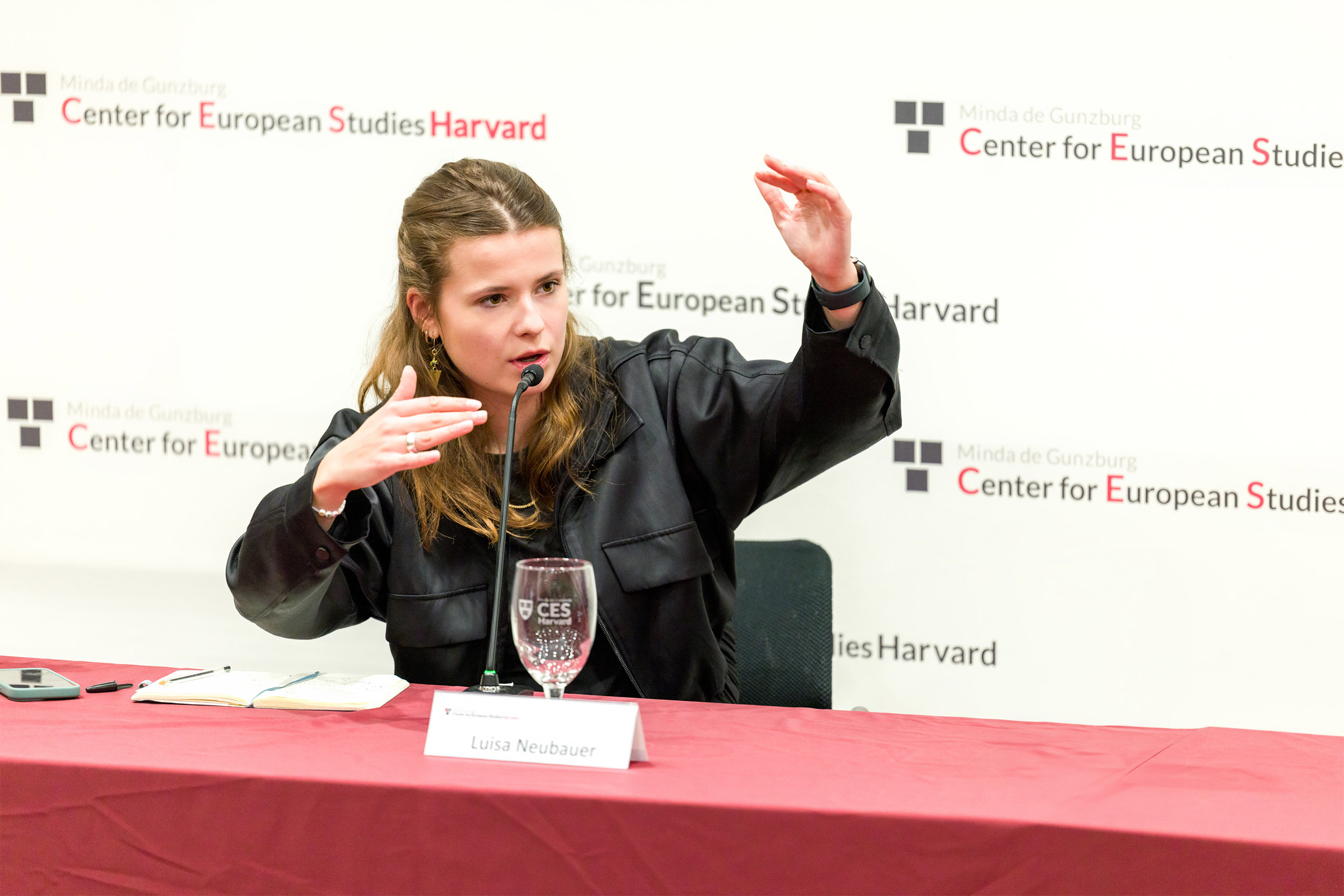“It is time to normalize the existence of the climate emergency,” said Luisa Neubauer, opening her talk “Defending Democracy and Safeguarding Our Planet: A Dual Imperative.” Instead, she said, “In every single household in the country, someone is asking: ‘Are you going to the climate strike? Shouldn’t we be angry? Shouldn’t we be active?’”
As Germany’s leading youth climate activist and organizer of the “Fridays for Future Germany” protests, Neubauer presented a holistic approach to the climate crisis that stressed individual engagement in what has become a battle for how we define ourselves.
The Minda de Gunzburg Center for European Studies event last week was co-sponsored by the Salata Institute for Climate and Sustainability. George Sarrinikolaou, the institute’s executive director and assistant provost for climate and sustainability, gave opening remarks, noting that “at a time when the climate is deteriorating and … a time of war in the Middle East, Ukraine, and Sudan,” Neubauer is “mobilizing millions of people to advocate for science-based climate measures.”
Neubauer, who is a John F. Kennedy Memorial Policy Fellow at CES and author of several books on climate activism (most recently “Beginning to End the Climate Crisis: A History of Our Future”) then explained her address as a bit of “thinking out loud” about how to be “more effective as a movement.”
“Hope isn’t a goodie bag to take home. Hope is work. Hope is our promise to the world to look for possibilities.”
Luisa Neubauer
“The discourse has gotten so discouraging,” she said. Exhibiting a slide showing the increasingly early flowering of cherry trees in Kyoto, Japan, she pointed out the undeniability of the science. “What we’re seeing right now is a climate change that exceeds our modern understanding of a changing climate,” she added.
All that data hasn’t counted for much, however, she said. Instead, she cited as “a stupid mistake, the idea that the presence of all that science would be our best argument for changing something.”
A new approach is necessary, she stressed. Instead of simply focusing on the data, we need to understand how fossil fuels are woven into our culture. Quoting President George H.W. Bush at the 1992 Earth Summit that, “The American way of life is non-negotiable,” she explained how decarbonization has been presented as a threat not only to prosperity but to happiness.
“The power of pop culture has led us to normalize our idea of what is a good life,” she said. Noting Western societies’ love of automobiles and the so-called freedom they offer, she pointed out that we live in “a cultural arena that has inhaled the very fossil fuel idea of a good life into every single aspect” — a culture, she added, where “a car would be safe, but I wouldn’t be.”
Fracking, for example, has become accepted by both presidential candidates as essential to our short-term vision of prosperity. “We’ve gotten to the point where the mainstream political understanding is that if you really love a country, you love it to the point of destruction.”
Living in a world where our biggest fear may be “Are they going to take away my car?” presents a particular challenge to anyone who cares about the climate crisis and longer-term issues.
“We need to understand these irrational historical connections,” said Neubauer. Outlining how climate change is presented — or ignored — in popular culture and how fossil fuels are presented as part of “the good life,” she encouraged the audience to see how widespread the battle is. “When we talk about the climate we never just talk about the climate,” she said. “We talk about everything in the room.”
To counter this, Neubauer said, we need to “widen our understanding of what is a climate discourse” to encourage people to “think deeply about the complexity of wealth.”
“If decarbonizing our democracy means ending with so many old ideas of what is a good life, then I would very much believe we need some good proposals.” Burrowing down to specifics, she said, “If people have spent their lives of dreaming of their own house, then people need new dreams.”
Changing societal goals is a huge task, she acknowledged. This can lead to cynicism and hopelessness. However, she encouraged activists to also embrace the human instinct to nurture and to heal. With this in mind, she discussed the nature of hope.
“Hope is very realistic,” she said. “Hope isn’t a goodie bag to take home. Hope is work. Hope is our promise to the world to look for possibilities. It doesn’t mean we’re going to get everything, but we’re daring to believe in what is possible.”
To mobilize that hope, she said, “Someone will have to start, and everyone is someone.”
The problem is huge, but, “we understand the assignment,” she said. Facing “a crisis that was produced by millions of people living their lives and dreaming their dreams,” we all must take action not only to educate others about climate change but to share awareness about how our culture has been built on fossil fuels and about how unsustainable such a lifestyle is for the Earth.
“A vast part of the environmental degradation is produced by very normal people every day,” said Neubauer. “We have long understood that tackling the worst catastrophes will not rely on this handful of people, institutions or tech billionaires, but rather the opposite.
“Humankind is quite capable of collaboration,” she stressed. “When tackling the climate crisis we have this huge advantage of we know what we’re fighting against. We know what we want.”
Source link

